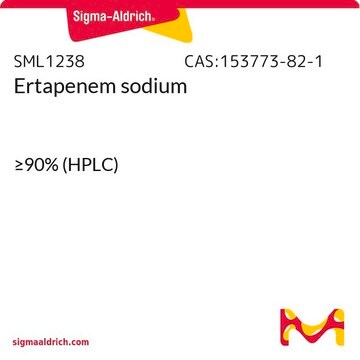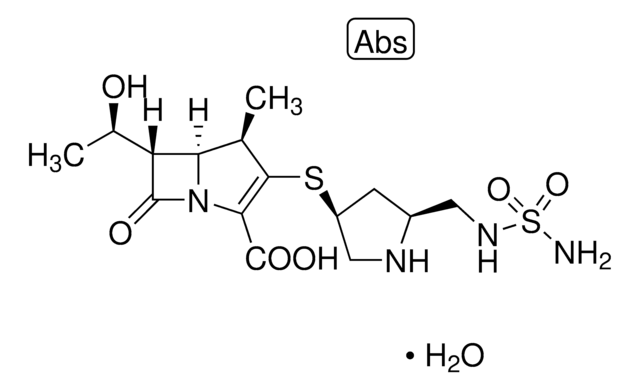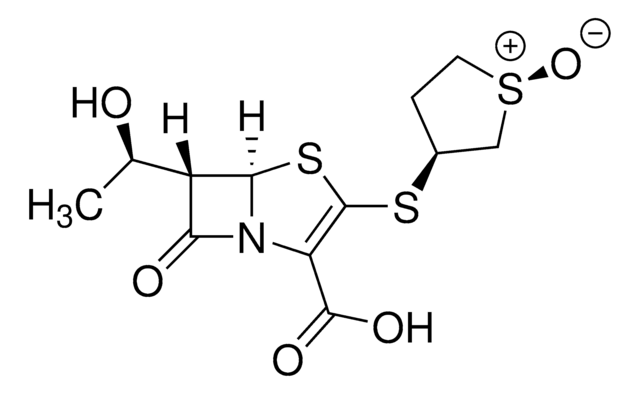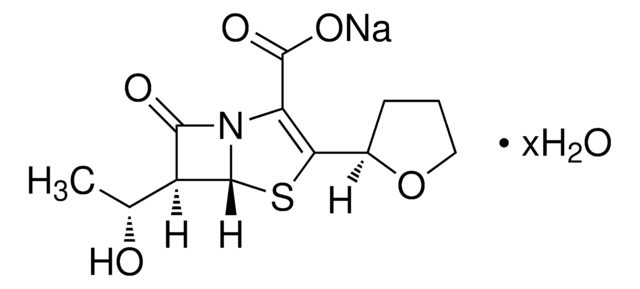M2574
Meropenem trihydrate
≥98% (HPLC), powder, antibacterial agent
Synonym(s):
(1R,5S,6S)-2-[(3S,5S)-5-(dimethylaminocarbonyl)pyrrolidin-3-ylthio]-6-[(R)-1-hydroxyethyl]-1-methylcarbapen-2-em-3-carboxylic acid trihydrate
About This Item
Recommended Products
Product Name
Meropenem trihydrate, ≥98% (HPLC)
Quality Level
Assay
≥98% (HPLC)
form
powder
storage condition
desiccated
color
white to off-white
solubility
DMSO: ≥20 mg/mL
originator
AstraZeneca
storage temp.
−20°C
SMILES string
O.O.O.C[C@@H](O)[C@@H]1[C@H]2[C@@H](C)C(S[C@@H]3CN[C@@H](C3)C(=O)N(C)C)=C(N2C1=O)C(O)=O
InChI
1S/C17H25N3O5S.3H2O/c1-7-12-11(8(2)21)16(23)20(12)13(17(24)25)14(7)26-9-5-10(18-6-9)15(22)19(3)4;;;/h7-12,18,21H,5-6H2,1-4H3,(H,24,25);3*1H2/t7-,8-,9+,10+,11-,12-;;;/m1.../s1
InChI key
CTUAQTBUVLKNDJ-OBZXMJSBSA-N
Looking for similar products? Visit Product Comparison Guide
General description
Application
- antibiotic susceptibility testing of E coli isolates from harbor estuary sediment samples
- in the bacterial killing assay and for screening antibiotic resistance of cystic fibrosis patient′s sputum based Staphylococcus aureus transformed macrophages in phagocyte infection
- for screening Enterococcus faecalis from human bile
Biochem/physiol Actions
Features and Benefits
Signal Word
Danger
Hazard Statements
Precautionary Statements
Hazard Classifications
Resp. Sens. 1 - Skin Sens. 1
Storage Class Code
11 - Combustible Solids
WGK
WGK 3
Flash Point(F)
Not applicable
Flash Point(C)
Not applicable
Choose from one of the most recent versions:
Certificates of Analysis (COA)
Don't see the Right Version?
If you require a particular version, you can look up a specific certificate by the Lot or Batch number.
Already Own This Product?
Find documentation for the products that you have recently purchased in the Document Library.
Customers Also Viewed
Articles
Bioactive small molecules for immune system signaling target identification/validation and antibiotics, antivirals, and antifungals offered.
Our team of scientists has experience in all areas of research including Life Science, Material Science, Chemical Synthesis, Chromatography, Analytical and many others.
Contact Technical Service












